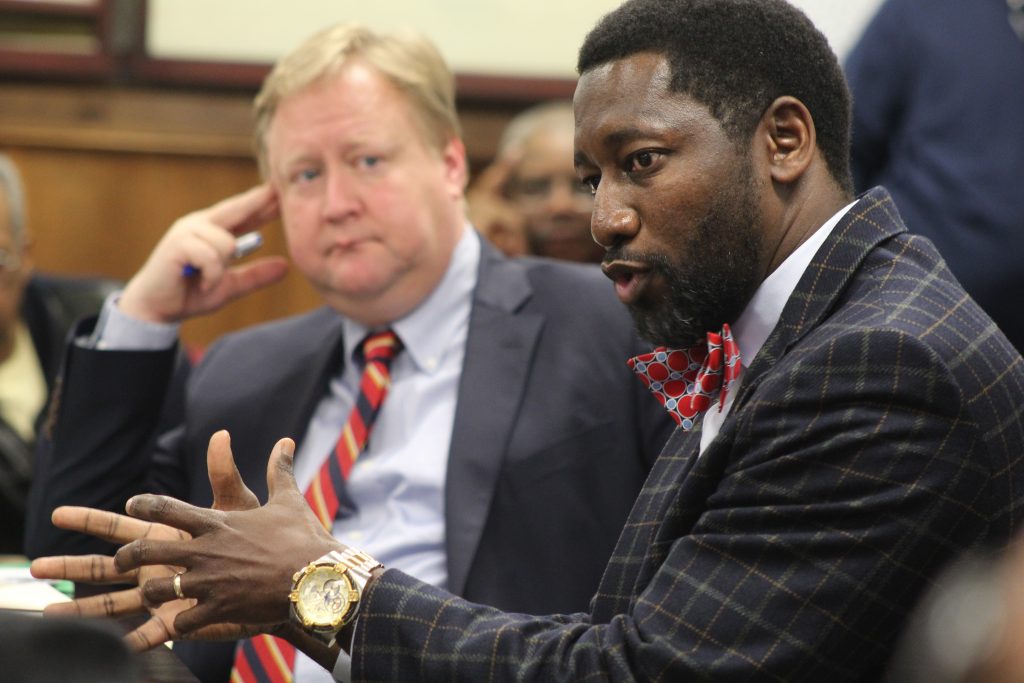
Costly travel, hefty compensation, lack of accountability uncovered
EDITOR’S NOTE: This story was produced through a collaboration of The Post and Courier and The Voice of Fairfield County, an Uncovered partner.
WINNSBORO — J.R. Green seethed with anger as he read an article in his local newspaper. The school district he leads was on winter break, but Green couldn’t stop fuming over the words on the page before him.
The Voice of Fairfield County reported that Green’s district had failed to meet certain state academic benchmarks. The article cited statistics to prove it.
Bristling at the critique, the superintendent fired off an email to his principals and school board. The missive, titled “False, Biased, and Misleading Reporting,” blasted the paper and accused its reporter of “marginalizing our students, staff, and system.”
“I want you to share this reporting with your staff so they understand the hostile media environment we face,” Green wrote that night in December 2018.
The fiery dispatch is emblematic of Green’s approach to uncomfortable questions and criticism during his nine years leading this high-poverty Midlands district of roughly 2,000 students.
In public forums, he has sidestepped questions about his taxpayer-funded salary and other points of contention. For years, he has rebuffed attempts to reveal how he spends thousands of dollars in public money.
It’s one striking example of how easily government officials in South Carolina can shield information from the public. In its investigative series Uncovered, The Post and Courier is partnering with local newspapers to help shine a light on questionable conduct, and hold the powerful to account in areas with few watchdogs.
Across South Carolina, particularly in rural communities that have become news deserts, officials are less likely to be pressed on their decisions, and more prone to set the public agenda themselves.
In this latest installment, a Post and Courier joint investigation with The Voice pierced the veil that shrouds Fairfield schools, one of South Carolina’s smaller, but well-funded, school districts.
Largely thanks to tax revenue from a local nuclear power plant, Fairfield schools collect more money per student than any other district in the state.
Year after year, top school district officials use a hefty chunk of the money for travel to pricey conferences at tourist resorts across South Carolina and the country, the newspapers found.
Between 2017 and 2020, Green’s office and Fairfield’s seven board members charged taxpayers for trips just about every month during the school calendar. That included dozens of trips to conferences at waterfront resorts in Charleston, Myrtle Beach and Hilton Head.
The annual bill for those and other trips? Nearly $50,000 — enough money to cover the salary of an additional classroom instructor.
With a $192,000 salary and his own $42,000 discretionary account, Green also charges the public for his district travel.
At the same time, the board has extended Green fat bonuses, contingent upon Green receiving passing grades in thin annual evaluations that lack measurable goals.
The one-page forms are filled out anonymously by board members and leave little room for comments or discussion — less rigorous than some first grade report cards.
That’s contributed to a vacuum of accountability in Fairfield, a community that does not have a daily newspaper.
The Voice publishes weekly, holding the district to account when student performance dips, or when top officials attempt to obscure their public spending. Green views that reporting – on scores, his evaluation and spending and his failure to disclose an out-of-state, overnight school-sponsored trip to the board – as an attack on the district.
In response, Green has warned district employees against speaking to The Voice, directing them, for the last two years, to send any information for The Voice (student achievements, honors, etc.) to the school’s human resources department for approval to be forwarded to The Voice. That information never gets forwarded. Then, Green took the matter a step further: He started the district’s own publication.
The Fairfield Post is distributed weekly around the county, often filled with campaign advertisements or columns penned by politicians.
“The Post is an opportunity to really lift up the good things that are happening,” Green said.
Taxpayers underwrite the costs, to the tune of $27,000 a year.
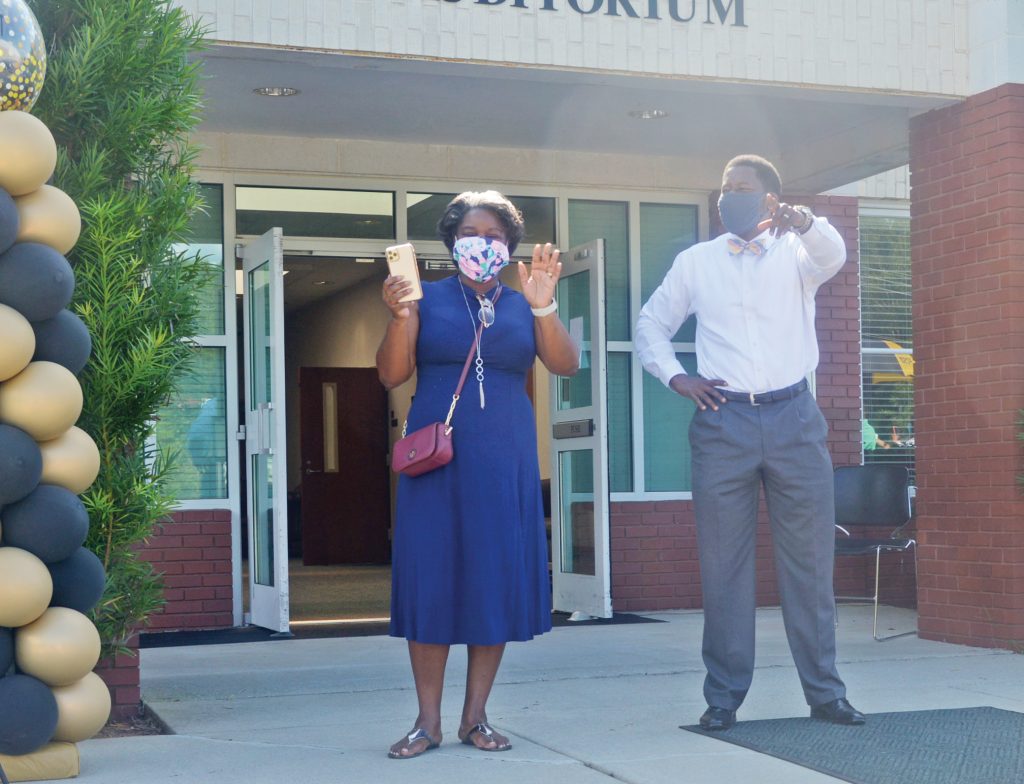
Green, whom the S.C. Association of School Administrators named the 2021 S.C. Superintendent of the Year, did agree to speak with The Post and Courier. He then conducted a lengthy discussion of the newspaper’s collaboration with The Voice at a May 11 school board meeting.
When reporters arrived, he asked them to leave, citing the district’s social distancing rules in response to the COVID-19 pandemic.
Still, a livestream broadcast Green’s remarks to the board — a defiant rant that stretched nearly 40 minutes. He fiercely defended the district’s spending of taxpayer money. He roundly criticized the state’s education statistics, which he described as an incomplete picture of the district’s progress with students.
Green also accused a reporter of questioning him because he is Black, describing this and other reporting by The Post and Courier as a suspicious effort to target people of color.
In other conversations with a reporter, Green stressed one point above all: He despises and distrusts The Voice. When asked to cite examples of the newspaper’s reporting, Green pointed to what he insists was a demeaning tweet sent by a Voice freelancer in 2019, months after he had cut ties with the newspaper. Otherwise, he only spoke generally about coverage he described as negative.
“I have confessed in (church) that there is animosity in my heart,” he said about the newspaper and its publisher. “I have to pray that the Lord removes it.”
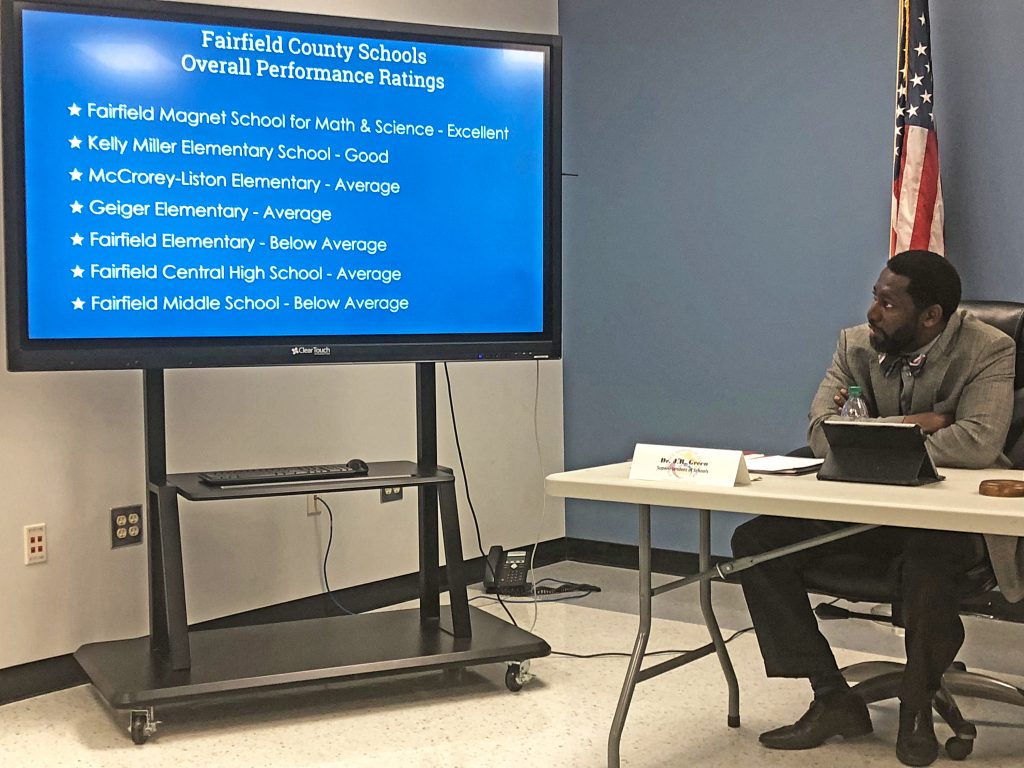
‘Change the culture’
Green didn’t always quarrel with the local newspaper.
“Community Turns Out to Meet New Superintendent,” read the headline in The Voice, above a photo of Green smiling for a photographer when the district hired him in 2012.
Green carries three degrees, as well as a doctorate in education leadership from the University of South Carolina. As a principal and assistant superintendent in Chesterfield County, he helped a high school bring up its grades on its state report card, and hit its year-over-year targets for improving student performance.
Meanwhile, Fairfield schools were rocked by extreme turnover in the district’s top position. Before Green arrived, Fairfield cycled through 12 superintendents in 20 years amid a period of dysfunction among the board. Local residents called the district South Carolina’s “graveyard for superintendents.”
The surrounding community also faced disruptions. Once-bustling Winnsboro, the county seat, hosted the headquarters of Uniroyal Tire Company. But the town lost businesses, jobs and eventually its hospital after the construction of Interstate 77 bypassed the community in the 1970s. The surrounding countryside remains largely rural, dotted with rolling pastures and horse and cattle farms.
Fairfield’s teachers and administrators educate a student body where school officials say nearly 90 percent of the children qualify for free or reduced lunch.
Green vowed to “change the culture” in an area that needed help. He stressed teamwork and an open relationship with the community. He has maintained a visible presence, regularly making appearances in front of television cameras for local news programs.
But eventually, some of those promises were tested as Green’s decision-making came under tighter scrutiny.
First, board members questioned why more than two dozen out-of-state and overnight trips were planned for student groups in 2015, including travel to New York City, Puerto Rico and the Bahamas. Board members questioned how much those trips would cost taxpayers. Green said he didn’t know. The board authorized the trips anyway.
Some board members also pressed Green on his use of the superintendent’s fund, roughly $42,000 in taxpayer money. Green has broad discretion to spend the money each year as he chooses.
While deliberating the district’s budget in 2017, then-board member Annie McDaniel asked why the board couldn’t get more details on his discretionary spending.
Green said he’d only share the information if the board voted to ask for it. Another board member at the time, Paula Hartman, pressed further.
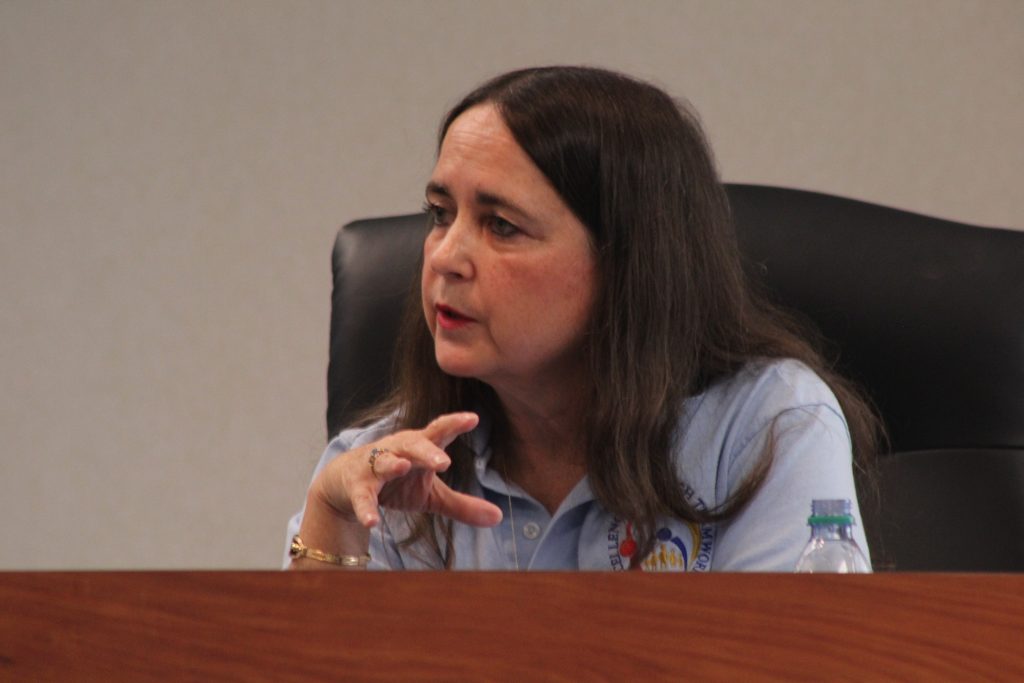
“Does that mean that you won’t give us that information?” Hartman asked.
“That means if the board directs me to provide it, I will,” Green said.
Beth Reid, then the board’s chair, suggested Hartman submit an inquiry under the S.C. Freedom of Information Act.
“If a person from the audience asked for that information, could they get it?” Hartman asked.
“Yes,” Reid answered.
“Then why can’t I?” Hartman asked.
A lack of access
The state’s open records law is supposed to allow for the free flow of public information, so any media outlet or citizen can easily see how their government is operating and spending the public’s money.
But the FOIA law is riddled with loopholes that officials can exploit to shield unsavory information from public view.
After a 2017 amendment to the
law, government agencies — for the first time — were allowed to charge residents and news outlets for costs that officials associate with retrieving or redacting documents.
But with vague guidelines, the amounts calculated by the government can far surpass what the average citizen can afford — hundreds, even thousands, of dollars.
At the same time, officials may freely ignore direct questions from citizens. Instead, they can insist that information only be released if requested under FOIA. That way, they keep public information in the dark for weeks, or even months.
The flaws in the system present major roadblocks for cash-strapped local newspapers around the state, including The Voice of Fairfield County.
After lashing out at the newspaper’s coverage of the district’s student performance in 2018, Green has not agreed to an interview with the newspaper in more than two years, and has blocked other attempts by the newspaper to gain information for stories that highlight the schools.
The end result is dwindling accountability, and an environment that limits the local newspaper’s ability to carry out its First Amendment duties, said Lynn Teague, vice president of the South Carolina League of Women Voters.
“It sounds totally unacceptable,” Teague said. “If I were a taxpayer in Fairfield, I would find it unacceptable.”
Green said The Voice is at fault for its poor relationship with him. He pointed to a 2019, incident that occurred long after he broke off communication with The Voice over reports on the school’s test scores.
After the state education department named a Fairfield instructor S.C. Teacher of the Year, a tweet from a Voice freelancer noted that Green sits on the same panel that selects the award.
Green took the remark as a slight that suggested the Fairfield teacher did not earn her recognition. “Simply despicable!!” he tweeted at the time.
The Voice’s publisher responded, “FCSD is rightfully proud of her accomplishment, as is all of Fairfield County.”
But Green told his employees that he does not trust The Voice — and that they should not either.
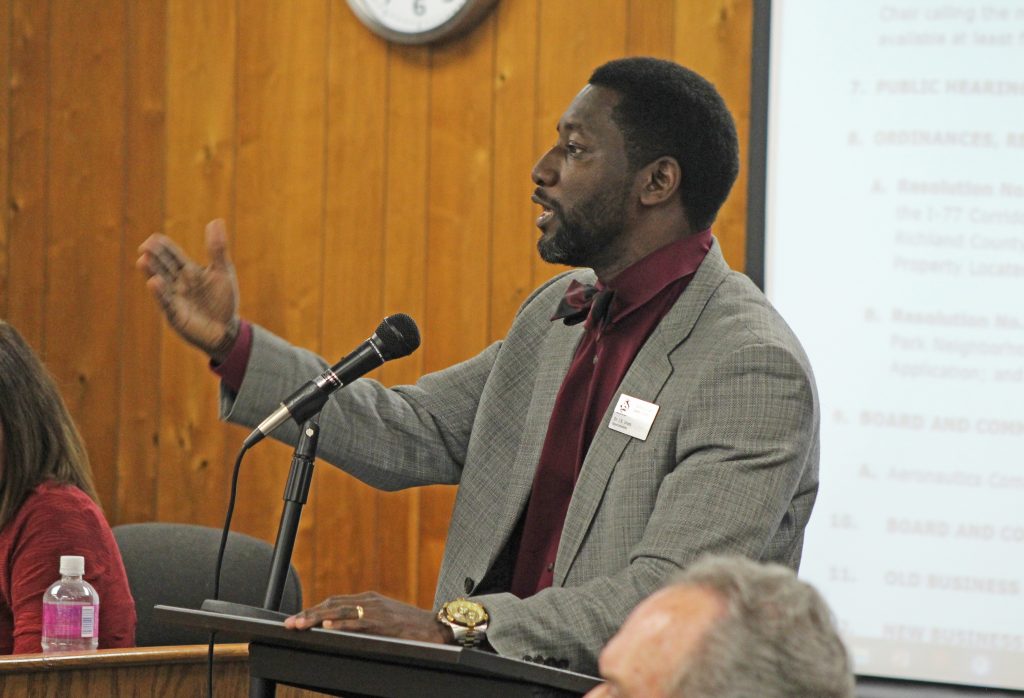
A steep fee
In 2019, The Voice requested access to records documenting two years of Green’s discretionary spending — an issue that had continued to divide members of the board.
After waiting 10 business days to respond, the maximum allowed under state law, Green insisted the information would cost $338. The Voice couldn’t afford to pay.
State law allows governments to waive fees and release public information for free, so The Voice asked Green to reconsider.
He waited another two weeks, then refused. He also rejected the newspaper’s requests to inspect the records in person, something reporters often do to avoid the costs of copying documents.
Asked about the matter by The Post and Courier, Green said he’s merely doing what the law allows him to do.
The Voice has a team of freelancers and one full-time editor and the publisher, who declines a salary. The publisher also supplements a roughly $150,000 annual budget by occasionally paying for rent and other expenses out of her own pocket.
Ultimately, The Voice dropped its request.
The newspaper agreed to partner with The Post and Courier on this article, in part, in an effort to obtain Green’s spending records — originally sought nearly two years ago.
When The Post and Courier sent its own request, for travel expenses from 2017-20, Green agreed to turn them over without a charge.
No discussion
The records show a steady drip of travel expenses for Green and his assistant. There’s also a bulk of purchases related to a Bow Tie Club trip (for the district’s teenage boys), led by Green, to Louisville, Ky., in 2019. While board approval is required for trips costing over $600, overnight trips and out-of-state trips, Green did not ask the board to approve the Louisville trip in advance, as is required for all three travel criteria. When later asked about the trip’s expenses at a board meeting, Green said he couldn’t recall details.
The actual cost to taxpayers? More than $10,100. That included lodging at the downtown Marriott; a $3,850 tour bus for students; and more than $700 in charges at the Louisville Slugger Museum, the Muhammad Ali Center and the world-famous Churchill Downs horse racing track, home of the Kentucky Derby. Green told The Post and Courier those expenses only covered costs of admission.
Hartman, one of the board members, unsuccessfully sought details about that trip. Green also rebuffed her attempts to learn how much he earns each year.
“We never got any information we wanted,” Hartman said.
At a 2018 board meeting, Hartman pressed for details of Green’s compensation. By that point, his salary had steadily increased over six years. His board-approved contract also entitled him to tens of thousands of dollars in annual contributions to his retirement account.
But when Hartman asked him how much money he made, Green said he didn’t know.
Now, Green’s salary has ballooned to more than $192,000. No superintendent of such a small district in South Carolina makes more, according to the most recent data from the state. Including his retirement benefits, his overall taxpayer-funded compensation is above $225,000.
Green told The Post and Courier he has agreed to freeze his benefits package at its current level.
“That’s what my spirit led me to do,” he said.
Pricey trips
Other records obtained by The Post and Courier show even more expenses — these charged by Fairfield’s seven board members for their travel.
In just over three years, board members charged taxpayers more than $123,000 in expenses for travel to conferences, including $52,900 in out-of-state travel.
It also included nearly 70 trips to waterfront resorts in Charleston, Myrtle Beach and Hilton Head. During school years, one or more school board members attended a conference just about every month, the records show.
The board’s travel between 2017-19 averaged $41,200 a year. By comparison, in the last full fiscal year before the pandemic, the board of Greenville schools spent less than $37,000 on travel. That board oversees the largest district in South Carolina. And it has 12 members, five more than Fairfield.
Fairfield board members disclosed their trips in reports provided during regular meetings. But they had little to add to inquiries from The Post and Courier. Most did not respond to phone messages and emailed questions about their travel.
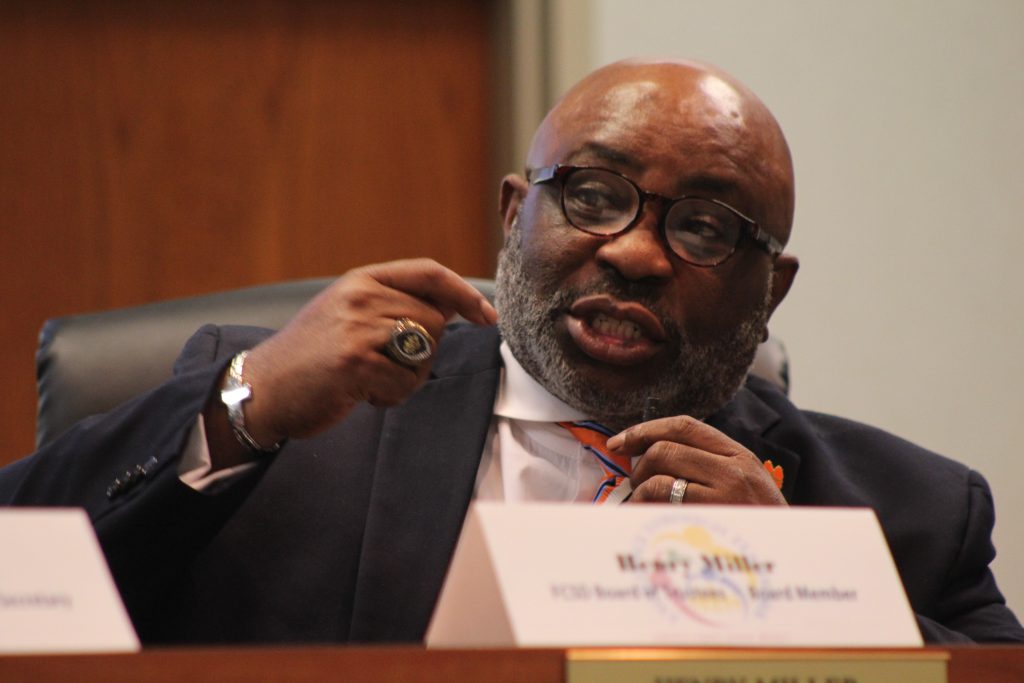
The board’s chair, Henry Miller, has charged the most in recent years — more than $31,500, records show. He did not return voicemails, but defended the travel in a written response.
“Investing in training and professional development is a vital component to becoming a more effective school board member,” he said.
Another sitting board member, Sylvia Harrison, spent more than $27,000, records show. She also briefly defended her travel. But after learning the newspaper was partnering with The Voice, Harrison said she wasn’t interested in a reporter’s questions.
“This is what you all do,” Harrison said. “It didn’t work for (The Voice) and it’s not going to work for you.”
Few comments
Green is supposed to receive more scrutiny during his annual evaluations from the board. But year after year he glides through the process, often without being pressed publicly on any aspect of his performance.
The board conducts its year-end discussions with Green behind closed doors. Then, board members submit one-page rubrics with benchmarks as vague as “community engagement.” The evaluations do not point to any measurable goals.
Board members do not have to sign their names, nor are they required to offer specific comments on how well the superintendent stacked up. Some leave no comments at all.
By comparison, Fairfield’s neighbor in Richland County School District Two, board members there evaluate their superintendent with six-page forms using far more detailed metrics.
State Representative Annie McDaniel, who sat on the school board from 2000-18, said Fairfield used to use a similar process. But some time during Green’s tenure the board pushed for a change.
“We went to a one-pager,” McDaniel said. “I wasn’t a fan of it, even though I thought that Dr. Green was doing some good things in the district,” she added.

Meanwhile, though the state has adjusted its metrics, Fairfield schools have about the same overall ‘average’ rating as when Green took the helm eight years ago.
In an interview, Green defended the district’s work with students and stressed that top officials continue to make changes. Most recently, after poor ratings in 2019, Green replaced the middle school principal.
“I’m never satisfied,” he said. “We recognize that we still have progress to be made.”
‘Negative’ coverage
Ultimately, it was the low ratings for Fairfield Middle School, and other middling district metrics, that were the subject of The Voice article in 2018 that set Green off.
He blasted the publication in his email to principals and other staff. Two months later, he took the matter a step further: He started Fairfield school district’s own newspaper, The Fairfield Post.
The newspaper features bylines from students. But with articles on community events and local elections, its coverage stretches well beyond the walls of Fairfield schools.
As Green puts it, “Anyone can submit a story.”
Local politicians regularly oblige. An early issue included a half-page editorial on education policy, written by state Sen. Mike Fanning. Another edition contained an unsigned feature on Green, after he received a special recognition from USC.
Throughout 2020, inside pages were filled with campaign advertisements and other content submitted by McDaniel, Winnsboro Mayor John McMeekin and Fairfield school board candidates.
Sen. Greg Hembree, the state senate education chair, told The Post and Courier that Green has waded into murky ethical territory, where the public underwrites a news publication with little ability to keep it from becoming a “propaganda arm” of the district.
Green told The Post and Courier he has no editorial control over the newspaper. He only reads and encourages the publication. Politicians pay for their advertising space, Green said.
Not everyone is convinced The Fairfield Post is a good idea.
Teague, with the League of Women Voters, said she’s not sure the arrangement is legal.
“The paper is a public resource, and it is being used for campaign purposes,” she said.
Green insists he did not start The Post to compete with The Voice.
“I’m not stopping them from writing anything,” he said, but neither is any information allowed to be released from the district to The Voice.
Harrison, the board member, also defended The Post while railing against coverage in The Voice.
She told The Post and Courier, “If it’s not positive, I don’t read it.”
After hanging up on a reporter, Harrison took to Facebook that evening to alert her followers about what she described as the latest example of biased news reporting. She insisted she had no intention of reading this article.
Besides, she added, “We have our own newspaper.”


Joseph Cranney is an investigative reporter in Columbia, with a focus on government corruption and injustices in the criminal legal system. He can be reached securely by Proton mail at [email protected] or on Signal at 215-285-9083.

Avery G. Wilks is an investigative reporter based in Columbia. The USC Honors College graduate was named the 2018 S.C. Journalist of the Year for his reporting on South Carolina’s nuclear fiasco and abuses within the state’s electric cooperatives.

Barbara Ball is the publisher of The Voice of Fairfield County and The Voice of Blythewood. Ball received the South Carolina Press Association’s Jay Bender Award for Assertive Journalism in 2018 and 2019. She can be reached at [email protected].












This article comes down to one thing: money.
Yes, our kids do travel. Our district has the available funding, and can use it to provide experiences that poor students and their parent chaperones who live here would otherwise not be privy to. It’s interesting to me that other districts with wealthy students who provide international trips for their students are lauded for providing travel opportunities for kids who already summer in Maine, winter in Vale, and fly to Europe yearly with their families, while we are denigrated for making travel accessible to students who cannot otherwise afford it.
I can still remember taking field trips to Columbia, Charlotte, Charleston, or Myrtle Beach as a child, and thinking they were hum drum. We went to Columbia every weekend. We went to Charleston and MB every year. We had been much farther away than Charlotte, as trips to visit family up the Eastern Seaboard usually took us through there. Then I began to listen. There were parents seated nearby for whom these trips were a first, let alone my classmates. Experiences like this one began to put the true reality of poverty into perspective for me at an early age, and still help to inform my decision making, today.
Jealous districts are constantly commenting on our money. I’ll tell you what Senator Fanning asked Greenville County School District the last time they chose to try and belittle our finances: Do we tell them how to spend their money from BMW? I’ll take it one step farther: Do we tell Charleston how to spend its Boeing money? I could go on.
The Elite Ladies and Bow Tie Clubs give students living in poverty the experience of being Debutantes and Beaus. Their journey includes months of classes in leadership, civics, etiquette, community service, etc., and culminates in a Debutante Ball/Beautilliion that they would otherwise be unable to experience. It is an important element of social development for our youth that broadens their outlook, and allows them to obtain the skills and confidence necessary to interact with people on a variety of socioeconomic levels.
We are thoroughly pleased with the special arts instructors who come to Fairfield. We have at least one performer come down from Broadway regularly, because her mother, who was a Fairfield native, came back to Fairfield when I was in high school. She and her husband worked in the theater throughout their careers. In addition to their volunteer work with the district, they also taught at USC during their retirement. As a result of their tireless efforts, we have one of the best Arts programs in the state, and regularly send kids to college at programs such as Julliard and SCAD (Full disclosure: My niece is a SCAD graduate).
Yes, any time that you have a district whose children are living in poverty, you will not be able to ensure that all of them go on to a four year school, but we have an impressive number going on to college, and many of them receive scholarships to do so. The schools that rate as excellent are Magnet schools, that bring top students from all over the district together under one roof. The ability of this majority poverty district to keep the remainder of those schools at Average, rather than Failing, without the assistance of those top scorers is undoubtedly impressive in its own right.
As for the incomplete picture presented by this biased reporting, I can also speak to that point: Two of my cousins who graduated from FCHS are bank VP’s. My classmate is a meteorologist. I have multiple schoolmates who are doctors, lawyers, engineers, research scientists, nonprofit executives, government administrators, politicians, college professors, etc. My cousin is an Electrical Engineer, and my classmate is a Nuclear Engineer. We emphasize the STEMS, and have a number of graduates who are working in computer science and other fields, holding advanced degrees as first generation college students in their families.
Another of my cousins opened his own successful plumbing business, while other family members and friends became police officers and other first responders, and members of the armed forces, and so our focus is not solely upon going on to a four year school.
Fairfield also boasts a top career center that prepares students for living wage jobs such as welding, carpentry, CNC, business, etc.
In addition, Fairfield has a partnership with Midlands Technical College that provides students with an opportunity to earn an Associate’s Degree simultaneously with their High school diploma, thereby making college more accessible, affordable, and tangible for our students, and potentially saving them tens of thousands of dollars in school and housing fees.
Also, the teacher pay rate in Fairfield is one of the highest in the state, and teachers who remain in Fairfield are actively encouraged to increase their knowledge, and paid for every additional qualification they receive. Every employee in the entire district receives a bonus that helps with employee morale and retention (that we funded, even before the state initially passed its proposed teacher pay increase).
The district has even waded into affordable housing territory, trying to leverage its funding to create a teacher’s village, where in addition to earning your way to a federal waiver on your student loans by working in our rural district, you could have also worked your way into home ownership. This plan had the potential to increase teacher retention in this small district exponentially, thereby allowing us to ensure that our children had ongoing access to experienced instructors.
These papers were able to find out how many trips our board members took. Did they mention that these conferences are almost always scheduled for a resort location, through no fault of our district personnel? Did they check to see whether the training overlapped, or whether our Board Members attended the classes, or whether those classes had real value, or are they just stuck on a dollar amount we can well afford? If our board was untrained, and did not understand its job, then that would be the next criticism. They talked about how we could fund another position in Fairfield with that money. Did they check to see whether we need to fund another position? What is the student/teacher ratio, P&C? What special class is missing? Clearly, we can see from these rudimentary questions you failed to answer that the substance of your reporting is missing.
Finally, how much do Fairfield’s alumni love our district? You would have to see our Homecoming celebration to believe it. People fly in from all over the country, and the world, to march with their old friends from the football, basketball, tennis, golf, baseball, volleyball, track and field, softball, etc. teams. They march with their friends from Band, and to be recognized for having been in JROTC, SGA, Drama, Art, Dance, Academic teams, Debate, etc. The parade goes on for hours. Then, we tailgate, we watch football, and we party with a purpose all weekend, to raise scholarship dollars for the next generation. In fact, if we have one problem for which I wish we could find a solution, it’s brain drain: We invest so much in our graduates over their youth, only to see other communities reap the benefits of that investment, when they leave us to follow the dreams that we gave wings.
Those, however, are not the human interest stories these papers want to hear. If they were willing to balance their negative reporting with more stories about our successes, the district and its employees would probably not be so disgusted with them. Sure, accountability is important, but when you are seeking to hold others accountable, you must first be willing to hold yourself to the same standard of excellence.
Unfortunately, like most liberal democrats, Ms. Pauling’s comments simply look to foster the divisiveness of our current national political climate here in Fairfield County. A quick look at her Twitter page will prove what her political leanings are. The comments in her response to the “voice” fall in line with the political talking points of the DNC and provide no factual argument toward the article. If you can’t divide them by race, which she didn’t, you use class warfare and decry that you are being targeted by the rich because you poor. At the beginning of her remarks, she claimed the reporting in the “Voice” was about “money”. She’s only partly correct. It’s not all the so-called “rich” people in Fairfield County picking on “poor” families. Just a short drive through any part of this county will quickly establish the vast majority of Fairfield County residents are NOT wealthy. That’s just a façade the left hides behind when their tax and spend policies come under public scrutiny. She concluded her remarks by acknowledging the necessity of accountability. Again, she’s only partly correct.
If Ms. Pauling was being transparent in her remarks, she would have come to the conclusion that “money and accountability”, when it comes to the transparency of taxpayer funded education in Fairfield county, translates into “return on investment”. What are the residents of Fairfield County, who pay taxes or have children in our public schools, getting in return for the exorbitant salary and benefits provided to Dr. J. R. Green in his capacity as the District Superintendant of Education? What are we or our children getting in return for the cost of nearly $20,000 in expenditures per student annually? Is it simply vindictiveness on the part of the press to ask the questions? Is it adversarial to tell the truth? Is it really about the rich versus the poor Ms. Paulings?
Let’s take a look at some data that I gathered from the website schooldigger.com. For the sake of transparency, the data on this website is gathered from the “National Center for Education Statistics, U.S. Department of Education, the U.S. Census Bureau and the South Carolina Department of Education”.
1. Fairfield High School ranks 202 out of 225 public high schools in the state of South Carolina
2. The average standard testing dropped from 20.76 in 2017 to 19.8 in 2018 and in 2019 it was 11.04. The lowest scores since 2005. They didn’t test in 2020. Thankfully, I believe.
3. Fairfield High School is currently ranked in the Bottom 10.2% of high schools statewide.
4. Total expenditures from state and local funds (taxes) totaled $18,112 or (92.4%) of the $19,606 per pupil expenditures 2020. In my opinion, this means the district has more of an obligation to answer to the parents and taxpayers in this county, than it owes allegiance to the state or U.S. department of education.
5. Great Falls High School average test score was 21.63 nearly double Fairfield County scores and yet in 2020 their $13,991 expenditures per student were down from $15,195 in 2019. Lower costs and better results.
Fairfield County pays Dr. Greene a total compensation package of more than $234,000 annually which is nearly double the salary of ($120,000 & 0 bonuses) South Carolina Superintendent of Education Cynthia Cash-Greene is paid to oversee the entire state public education system. Satirically, yes Ms. Paulings, it is about the “Greene Backs” and it’s about the hardworking and fixed income retirees in Fairfield County not getting their monies worth when it comes to educating our children.
Just like the Bloc of four on the county council, whether it be the caustic hyperbole of Chairman Moses Bell or the contempt with which Councilwoman Shirley Greene treats the nearly half of the residents in her district that didn’t vote for her, Ms. Pauling simply uses her remarks to point fingers in an attempt to divide and direct blame at those who have differing beliefs.
Whether it is Chairman Bell trying to compare residents of Fairfield County to armed mobs in Washington D. C., or shutting down public access and input from other council members in a way that would make Nancy Pelosi proud, this council has demonstrated there is no accountability to the residents of Fairfield County when it comes to the left. His message is “sit down, shut up and do as I tell you”.
Or, you could look at a FaceBook post by Councilwoman Shirley Greene dated 23 October, 2020 (11 days before the election) in which she poses with a hard hat and shovel in front of the future site of the fire station on River Rd. in Ridgeway. The image was intended to create the appearance of her participating in a ground breaking ceremony. The problem with the image was she was not on the council at the time she posted it nor did she have anything to do with the county obtaining that land and appropriating the funds for the new fire station. Heck, why not just post a picture of her holding a big cardboard check printed for a $1,000,000 made payable to the Fairfield County School District and create the appearance she made a donation. Both images would be equally dishonest propaganda provided for public consumption days before an election.
Even more disturbing than creating that misleading image itself, was her response to a resident in her district who pointed out how dishonest that was. She basically told the resident to go pound sand and that they needed to get over the election because she won by 8 votes. That’s a rather caustic and combat way to treat a resident in the district she “represents”. It’s especially telling that she took that approach just weeks after being sworn in as a public servant. She clearly only represents half +8 of the residents in her district, the other half can just “get over it”.
Ms. Pauling is as genuinely cognizant of “accountability” in her response, as the bloc of four is in their acceptance of being accountable to anyone in this county except themselves. It’s time to stop the charade and no I’m not talking about the political “science” behind Covid restrictions. It’s time to stop trying to infect the lives of the hard working, hard praying, generous and friendly people of Fairfield County with the falsehoods that define the democratic national platform of divide along all lines and in all places. We live quiet, peaceful, meaningful lives in this county. We get along with one another. We share in our successes we account for our failures. It’s time Dr. Greene, The bloc of four on the county council, and successful people like you, who are a product of growing up here in Fairfield County stop trying to drag our good name through the national mud the left likes to throw around.
Great reporting!
As an employee of a Fairfield County School, I agree with most of what you have said. The student trips are great and wonderful, and they do provide experiences to our children that they would otherwise not get. As far as the salary increases go, the pay bumps for extra education are only for those who have a teaching certificate. I am working on my master’s and should have moved up pay classes over the summer because of that. When asked, I was told that “you do not qualify because the education is not required for your position.” This is true, but the education IS required for any kind of advancement. The schools as a whole have a rampant lack of communication that I see every day from the inside. Also, because I am not studying to be a classroom teacher, Fairfield gives me no tuition assistance whatsoever.